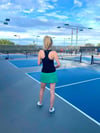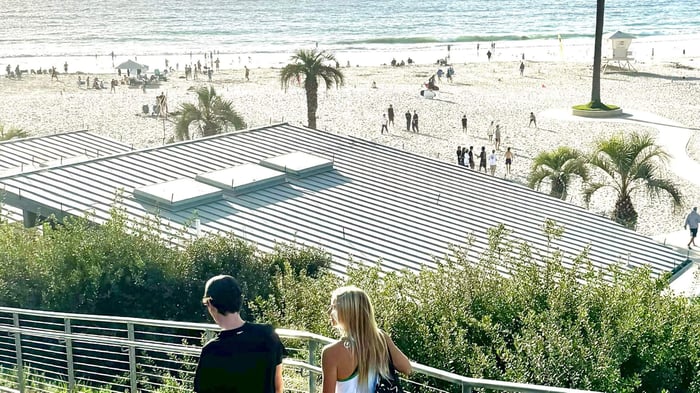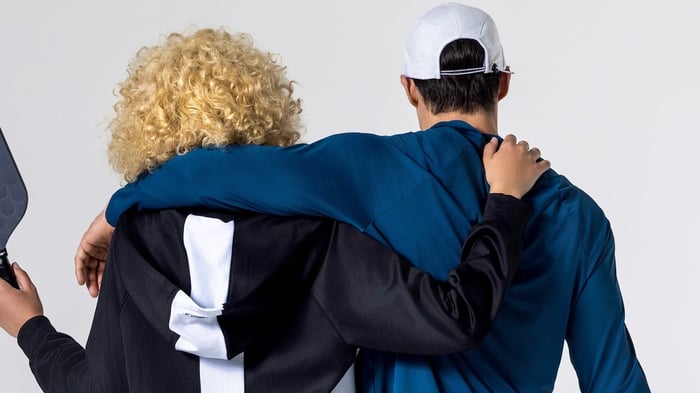Key takeaways:
Pickleball fosters multigenerational connections, creating a unique community where players of all ages and skill levels bond and learn from one another.
Intentional actions like mentorship programs, beginner-focused sessions, and inclusive events are key to building a welcoming and thriving pickleball community.
Strong social connections formed through pickleball drive long-term participation, personal growth, and a sense of belonging beyond the court.
Building a stronger pickleball community starts with how we play, connect, and support one another. Multigenerational play fosters mutual respect and understanding, bringing people together in ways far beyond the court. It's not just about the game; it’s about creating lasting bonds rooted in shared values and inclusivity.
The real impact comes from approaching pickleball with intention. Simple actions like pairing experienced players with newcomers or organizing mixed-skill events lay the groundwork for meaningful relationships and an inclusive culture. Confidence on the court inspires others to join and contribute. At PB5star, we offer gear that helps you play with the style and confidence that builds community.
The power of social connection in pickleball
The magic of pickleball extends beyond the court; it thrives in the connections formed among players. Engaging in this sport fosters a social movement that unites individuals across ages and skill levels. These authentic relationships drive long-term participation, transforming casual players into dedicated enthusiasts who return for the game and the community.
The ripple effect of these connections is evident in how engaged participants behave. They volunteer, mentor newcomers, and recruit friends, creating a sense of belonging that enhances well-being. This organic growth explains why pickleball communities often expand through word-of-mouth. At the heart of thriving communities lies a foundation of shared values, where respect and encouragement foster lasting friendships, making every player feel better after each game.
Welcoming new players: The foundation of growth
Creating a welcoming environment for beginners starts with intentional actions that make newcomers feel valued from their first game. When experienced players take small steps to include and encourage fresh faces, they build the foundation for a thriving, long-term community.
Make personal introductions: Greet first-time players by name, share court etiquette basics, and offer simple technique tips between games.
Establish mentorship programs: Pair experienced players with beginners for ongoing guidance, creating relationships beyond single matches.
Host beginner-focused sessions: Organize dedicated practice times where newcomers can learn fundamentals without feeling rushed or intimidated by advanced gameplay.
Celebrate small wins: Acknowledge improvement in developing players, whether their first booming serve or a well-placed shot, fostering enthusiasm that keeps them returning.
Organize structured learning clinics: Beginner clinics significantly improve comfort and skill development, leading to better retention.
Foster patience and encouragement: Model supportive behavior that other experienced players will follow, creating a culture where mistakes become learning opportunities rather than sources of embarrassment.
The growth and longevity of any pickleball community depend on how it welcomes its newest members. By prioritizing kindness, mentorship, and inclusive opportunities to learn, experienced players set the tone for a supportive culture. Every personal introduction, encouraging word, and beginner-focused session reinforces that this space belongs to everyone.
Organizing inclusive pickleball events
Pickleball thrives when it brings people together, not just to compete, but to connect. Whether you're hosting a small round-robin or a full-scale tournament, how you design your event can make a big difference in who feels welcome and included.
Mix skill levels intentionally: Design tournaments and open play sessions to include a range of abilities. Blending experienced players with newcomers encourages mentorship, reduces intimidation, and prevents exclusive cliques from forming.
Rotate partnerships regularly: Ensure players switch partners throughout the event. This fosters a sense of inclusivity, helps participants meet more people, and encourages flexible playstyles and teamwork.
Host themed social tournaments: Organize fun events like Retro Pickleball Night or Holiday Spirit Games. Themes add excitement and personality to your event, making them more memorable and approachable for players of all levels.
Plan post-game gatherings: Offer snacks and set up relaxed areas for conversation after matches. These moments allow for reflection, bonding, and friendship-building beyond the court.
Create simple registration systems: Set up sign-ups through user-friendly tools or community boards. Include event format, skill level guidance, and required items so participants know exactly what to expect and feel comfortable joining.
Partner with local businesses: Collaborate with neighborhood sponsors for supplies, prizes, or venues. This strengthens ties between your pickleball group and the broader community while keeping event costs manageable.
Inclusive pickleball events are powerful platforms for community building. When you prioritize diversity, communication, and fun, you create spaces where players of all backgrounds feel valued and engaged. By blending skill levels, encouraging social interaction, and fostering local partnerships, you lay the foundation for better games and stronger, more connected communities.
Supporting new players with actionable resources
Supporting new players in pickleball goes beyond just being friendly on the court. Creating structured pathways for growth and connection transforms nervous beginners into confident group members who stick around for years.
Pair newcomers with patient mentors: During games, beginners should be paired with experienced, encouraging partners. These mentors can offer real-time on-court tips, boost skills, and create meaningful connections through shared play.
Celebrate small wins publicly: Recognize milestones like improved serves, better court positioning, or consistent attendance. This kind of positive reinforcement motivates players and builds a sense of momentum.
Connect beginners to local clinics: Recommend structured learning environments like community centers or YMCAs. These programs are designed for newcomers and offer professional guidance in a low-pressure setting.
Share comprehensive gear guides: Offer easy-to-follow guides that outline essential gear versus optional extras. This helps new players avoid unnecessary spending and gear confusion.
Direct players to online support networks: Point beginners to active communities like the r/Pickleball subreddit. With thousands of members sharing advice and encouragement, it’s an excellent place for support between games.
Emphasize hydration and preparation: Teach new players to come prepared with water, snacks, and proper gear. Staying physically comfortable allows them to focus entirely on learning and enjoying the game.
Welcoming new players into the pickleball community is about more than just teaching technique; it’s about creating a supportive, inclusive environment that nurtures growth and enjoyment. By pairing beginners with patient mentors and connecting them to the right resources, we build their confidence on the court and strengthen the social fabric that makes pickleball so rewarding.
Connect, share, and play with PB5star
Players who show up with purpose, connection, and pride in their play build a stronger pickleball community. Every match, every interaction, and every piece of gear contributes to the inclusive, spirited culture that defines the game. When performance and community go hand in hand, the result is a playing experience that’s as meaningful as competitive.
Fostering this kind of environment means being intentional, welcoming others, encouraging growth, and showing up to win and connect. It’s in the small moments: offering a tip to a new player, cheering on a teammate, or simply wearing gear representing your passion for the sport and the community behind it. At PB5star, we support that mission with apparel and gear designed for confidence, comfort, and connection.
FAQs
How can local pickleball players create a welcoming environment for beginners?
Start with small acts of kindness, like walking through the scoring system or helping newcomers find the right playing partners for their skill level. Organize recreational play sessions specifically designed for beginners, focusing on learning fundamentals rather than competitive play. When nervous newcomers feel genuinely supported instead of judged, they become regular players who love returning and often bring friends along.
What teaching techniques work best when mentoring new pickleball players?
Break down complex concepts into simple, manageable steps, like in a classroom. Focus on one skill at a time, whether proper paddle grip or court positioning, and use positive reinforcement to build confidence. Pair visual demonstrations with hands-on practice, and remember that everyone learns at their own pace, so patience and encouragement go much further than criticism.
What are the best ways to organize events that unite the whole community?
Mix skill levels during events by rotating partners and creating formats where experienced players naturally mentor newcomers through gameplay. Plan social elements around the matches, such as post-game gatherings, themed tournaments, or casual meetups, to help build friendships beyond the court.
How does social connection drive long-term community growth?
The friendships formed through pickleball create a ripple effect; connected players become your best recruiters, bringing family members and coworkers to try the sport. When people feel they belong to something bigger than a game, they naturally volunteer for events, mentor newcomers, and help sustain group activities.








